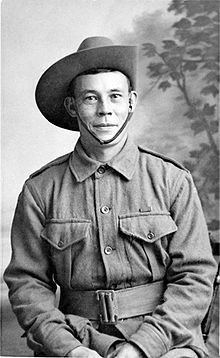Billy Sing
| William Edward "Billy" Sing | |
|---|---|

W. E. Sing, c. 1918
Australian War Memorial P03633.006 |
|
| Nickname(s) | The Assassin, The Murderer, Billy |
| Born | 2 March 1886 Clermont, Queensland |
| Died | 19 May 1943 (aged 57) Brisbane, Queensland, Australia |
| Buried at | Lutwyche War Cemetery, Brisbane |
| Allegiance | Australia |
| Service/branch | Australian Imperial Force |
| Years of service | 1914–1918 |
| Rank | Trooper |
| Service number | 355A |
| Unit |
5th Light Horse Regiment 31st Infantry Battalion |
| Battles/wars | |
| Awards |
Distinguished Conduct Medal Mentioned in Despatches Croix de guerre (Belgium) |
| Relations | John and Mary Ann Sing (parents) Elizabeth Sing (née Stewart; wife) |
| Other work | Stockman, sheep farmer, gold miner |
William Edward "Billy" Sing, DCM (2 March 1886 – 19 May 1943) was a part Chinese Australian soldier who served in the Australian Imperial Force during World War I, best known as a sniper during the Gallipoli Campaign. He took at least 150 confirmed kills during that campaign, and may have had over 200 kills in total. One contemporary estimate put his tally at close to 300 kills. Towards the end of the war, Sing married a Scottish woman, but the relationship did not last long. Following work in sheep farming and gold mining, he died in relative poverty and obscurity in Brisbane during World War II.
Sing was born on 2 March 1886 in Clermont, Queensland, Australia, the son of a Chinese father and an English mother. His parents were John Sing (c. 1842–1921), a drover from Shanghai, China, and Mary Ann Sing (née Pugh; c. 1857–unknown), a nurse from Kingswinford, Staffordshire, England. Sing's mother had given birth to a daughter named Mary Ann Elizabeth Pugh on 28 May 1883, less than two months before marrying Sing's father on 4 July 1883. It is unclear whether this child was John Sing's daughter as well. A daughter, Beatrice Sing, was later born into the family on 12 July 1893. The three children grew up together on the farm run by the Sings, and all three performed well academically.
There was considerable anti-Chinese sentiment in Australia at this time. As a boy, Sing was well known for his shooting skill, but was the subject of racial prejudice due to his ancestry. He began work hauling timber as a youth, and later worked as a and a sugarcane cutter. Sing became well known for his marksmanship, both as a kangaroo shooter and as a competitive target shooter. In the latter role, he was a member of the Proserpine Rifle Club. He regularly won prizes for his shooting, and also played cricket with skill.
...
Wikipedia
